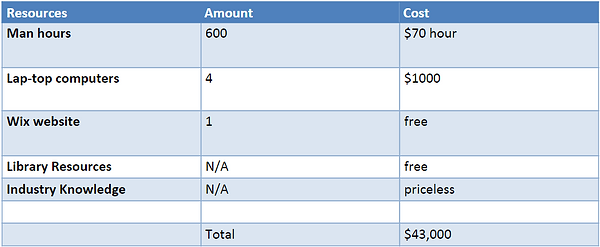Project Charter
Project authorization
Project Supervisor:
Nicola Brown
Massey University
We have been authorized to carry out a project challenge given to us by Massey University for the year 2070 by our project supervisor Nicola Brown. Our project challenge will be carried out under the supervision of our project supervisor Nicola Brown.
Project context
New Zealand Forestry is an industry worth 4% of GDP totaling $4.6 Billion in exports. Wood chips, whole logs, lumber and paper products are exported from New Zealand. There are 8 Pulp / Paper mills currently producing paper around New Zealand.
Globally Paper production generates $567 Billion revenue annually. Over the past 5 years the industry has seen a steady yearly 0.5% decline in revenue. This is primarily due to the transition to digital communication and paperless media. This has been partially offset by the boom in manufacturing demand for paper in packaging other products especially in emerging economies. Paperboard and Packaging Paper are now the largest segment and account for 42% of pulp use in worldwide production in 2015. Experts predict that the paper industry will place even greater focus on packaging materials and hygiene products in the future as these sectors are the most promising for growth.
For our project we will focus on the New Zealand paper industry and its challenges in the year 2070.

Key stakeholders and their relevance to the project
External Stakeholders:
-
New Zealand Paper Industry – External Client
-
Forestry Corporations – External Client
-
New Zealand Economy – External Client
-
Environment
Internal Stakeholders:
-
Team- Internal Client
-
Supervisor- Internal Client
-
Massey University- Internal Client
Project outcomes
The outcomes for our project are to first identify the possible difficulties the NZ paper industry will face in the year 2070. We will have to identify the paper products that will decrease in demand in the “Electronic Age” and which products have the possibility to increase in demand to keep paper production a relevant NZ export. This will ideally future proof the New Zealand paper industry
What is considered a successful outcome?
A successful outcome would be one where the information we gather will allow the paper industry to continue being successful in New Zealand. This is so it can continue to draw profits and contribute to the New Zealand economy. Ideally our studies will help in future proofing the paper industry in New Zealand and we'll do this by observing trends, observing their methods and researching potential aspects that could cripple it.
The value of a successful outcome
Financial: a successful outcome will allow the paper industry to pick up profits and be sustainable in future years. This can be done by modifying their methods, optimizing their output to demand ratio and broadening their market.
Environmentally A successful outcome will be one where monitoring the effects of the paper production on the environment will reduce the damage and carbon footprint of the process.
Socially?
Constraints:
-
Some methods will be restricted to inside knowledge only.
-
Some trends such as weather patterns and stock market will not be able to be extrapolated with a high degree of certainty.
-
Future problems and issues may be unpredictable
Project scope
Our project is mainly aimed at the New Zealand paper industry. However the effects will reach the rest of New Zealand and their economy. And with optimizing it on the global market may also affect some parts of the rest of the globe
Risk Assessment

Project Timeline


Project Management Plan:
Our groups plan for this project is to split up the workload evenly, then corroborate our findings over OneDrive and group in meetings. All meetings are recorded in minutes then relayed back to our website. Our weeks will be planned in advance so our milestones are met on time.
Project Resources

Project deliverables
Our end custom being Massey University will receive.
-
1 x working website.
-
1 x Final industry solution for the year 2070.
-
1 x design presentation.
*website to include, Current industry, Future challenges and Design report.
Key project performance criteria (metric)
A successful project solution is one that ensures the continued New Zealand exports of paper and paperboard by solving or avoiding challenges that can arise in the future.
Successful solution traits will include:
-
Reliability
The design should future proof New Zealand’s Paper Industry
-
Efficiency
Continuing to create revenue for New Zealand
-
Cost
Low costing solution that has the best yield
Minimal costing for any materials
-
Environmental
Minimal pollution/waste during production
Little to no impact on New Zealand forests
-
Safe
Solution that does not harm consumers through distribution or assembly
-
User-friendly
A successful solution will be able to complete all project deliverables and be presented on a creative and visually appealing website.

Health and safety
If any practical work is needed in this project the workshop safety course must be taken by all members to ensure that the team is safe. If/When practical work is done workshop safety procedures must be undertaken so that no one will get injured.
Change control
Any changes that are made to the project plan or charter will need to be checked over by the team and Supervisor. This is so that there will be no confusion, mixed messages or wrong inputs that could cause a delay in progress. These changes may also need to be checked over by stakeholders if they are effected. Changes to anything can be bought up in the weekly meeting, during the Monday project class or through communication over Facebook/texting.
Communication Plan:
We plan to meet weekly at Thursday 3pm in addition to the scheduled project day on Mondays. This will allow the team to discuss future project tasks, objectives to be completed before the next project day etc. All members have access to the group Facebook page for further communication and progress updates out of meeting times. Meetings with project supervisors are already scheduled for Monday afternoons so they can keep track of our project.


